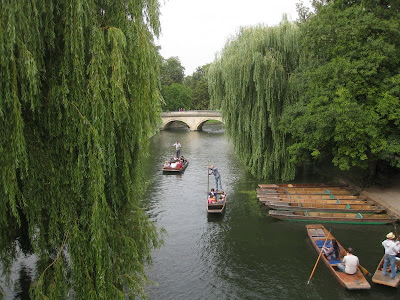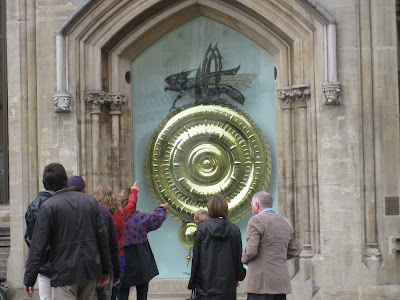
By Claire
Cambridge, 60 miles north of London, is world-famous for its prestigious university. Wordsworth, Isaac Newton, Tennyson, Darwin, and Prince Charles are a few of its illustrious alumni. We spent two days here after a relaxing couple of days at the Commons Wood Caravan Club site in Hertfordshire, €22.08. We're now in a campsite that is set in an old chalk quarry and a nature reserve, Cherry Hinton Caravan Club, €24.24.
The town of 100,000 is dominated by the university, which owns most of Cambridge--all colleges are self-supporting. It definitely feels like a college town, with bicycles streaming past, plenty of bookshops and stately residence halls.
We spent our first day walking around, taking everything in. We were lucky to meet and talk to David, a guard at Trinity College, whose job it was, in part, to keep people off the grass and outside the entrance to the college. He directed everyone around the corner to the front entrance. He was a wealth of knowledge, explaining the system here (he is originally from Canada) and letting us know that Prince Charles only scored a 2.2, which is only adequate, on a 3 point scale. Fees come to about £3,000 per year but most students do get student loans to cover their costs. Each college is also a business and they use their profits to partially subsidize the education of their students. Trinity College is the wealthiest; it owns a port and a business park much like California's Silicon Valley. It is also the most popular and prestigious.
By 1350, Cambridge had 8 colleges; today it has 31. Half of its 82 Nobel prize winners come from Trinity College. Like Oxford (referred to as "the other place"), while students' lives revolve around their independent colleges, the university organizes lectures, presents degrees, and promotes research. The main difference between the two towns, for me, is that Oxford is a town with several colleges whereas Cambridge is a set of colleges in a town--there is more of a sense of adjacent campuses, here; also, the town seems larger and more complete; finally, you can punt down the Cam, here, and see the backs of many of the colleges.
Punting on the River Cam

We stopped at a pub near the campground on our way home and had a great dinner out in their beer garden. Chuck, ever the brave one, had suet pudding with vegetables, mashed potatoes and gravy. I had a vegetable curry which was just fine. He loved his.
Chuck's dinner of Suet Pudding

Claire's Vegetarian Curry

On our second day, we went on a two hour walking tour offered through the Tourist Information office for £10 each. It was excellent and the time flew by. We started at the Eagle Pub, opened in 1667 and owned by the Corpus Christi College, it has an historic ceiling of writings of two air forces during WWII, the RAF and the United States 8th air force. They used cigarette lighters, lipstick and candles to leave their mark.

The pub is also famous for the spot on February 28, 1953 where Francis Crick and James Watson made the first public announcement of the discovery of DNA with the words "We have discovered the secret of life." Throughout their early partnership Watson and Crick dined in this room six days every week.

These are some images of Cambridge.
King's College

Are we in the country or the city?

King's College from the Backs


St. John's College along the River Cam

St. John's College

Clare Bridge, oldest bridge, 1640

Queens' College

Queens' College dining room ceiling

Mathematical Bridge with punters in the rain

One of the biggest tourist attractions, this clock, designed by Dr. John Taylor at a cost of over £1 million, has no hands or numerals but indicates the time using blue lights focused through different slits in the face. The lights, controlled by the escape wheel, move in concentric circles pausing to indicate the hour, minute and second.
The clock strikes the hour with the sound of a chain dropping into a coffin to symbolise mortality.
It also plays tricks with the observer, creating the illusion of pausing, running unevenly and even going backwards. All this is done mechanically rather than by computer.
The design was inspired by the early English clockmaker John Harrison who invented the so-called 'grasshopper escapement' mechanism which is usually hidden inside the clock itself.

On interesting story was about Magdalene College--which is pronounced 'maudlin'. From 1972, the previously all-male colleges in Cambridge started admitting women with full status, the first being Clare College and King's College. Magdalene made the controversial decision in 1986 to admit women and go co-residential. When women eventually joined the college in 1988, male students protested by wearing black tie, black arm-bands and flying the college flag at half-mast. They also floated a coffin down the River Cam. In 1881, women gained the right to take the Tripos examinations, and were offered University certificates if they passed--not in a graduation ceremony: these were mailed to them.
Wren Library

We were lucky enough to have time to race over before closing time to see the Wren Library inside. They only allow 15 people at a time inside and they are only open from 12:00-2:00 pm. Inside are glass topped display tables with famous books and manuscripts. We saw one of A.A. Milne's original books (he and his son Christopher both attended Trinity College at Cambridge). Sir Isaac Newton's own copy of his Mathematical Principles of Natural Philosophy, 1687, was there with corrections in his own hand for his second edition. The display also contained a lock of his hair, a pocket watch and his walking stick.
I was especially impressed with the Winchester (or Trinity) illuminated Gospels from the early 11th century. It is one of the best examples of the style of illumination which was practiced in Anglo-Saxon England from 950-1066. Known as Winchester School style, its hallmarks are strong colors and a lavish use of gold. Ever since reading People of the Book, I have really been able to marvel at these illuminated books.
The other two things that wowed me were the first folio edition of Shakespeare's comedies, histories and tragedies from 1623 and a 1731 letter from Jonathan Swift with directions to his butler, cook and footman.
Chuck was impressed with Ludwig Wittgenstein's (1889-1951) notebooks and Bertrand Russell's (1872-1970) letter on the implications of the atomic bomb. Wittgenstein is often claimed to have inspired two divergent schools of Philosophical thought: logical positivism, and ordinary language philosophy. Early in his career, he devised plans for a jet engine. Russell held almost every possible Philosophical position in his very long and illustrious career. He was a pacifist--until WWII--for which Sidney Hook declared him an "intelligent pacifist" while an intolerant Vietnam generation often called him a hypocrite.
Inside the Wren Library

We ended our time with lunch at the Eagle Pub.
Chuck's lunch: Eagle Platter, classic pub lunch with Melton Mowbray pork pie, hand carved ham, organic baguette, mixed salad, apple and a selection of pickles.

I had a pasta with grilled vegetables.
Nature and nature's laws lay hid in night;
God said "Let Newton be" and all was light.
~ Alexander Pope


5 comments:
Just another (yawn) awesome day! How will you EVER be able to go back to everyday life in Davis?
Chuck, your suet pudding dinner? Not so awesome....sorry. It looked greasy, was it?
I loved the Cambridge shots. The punters in the rain....looks so refreshing!
Karin on Paros
Today was 105 at 11:00 AM on my porch....but swimming was nice!
Hi Karin
I don't think re-entry to Davis will be difficult. We shall see.
The suet did not taste greasy; but, the pork pie had a layer of grease, which I attempted to scrape off--too much authenticity can be dangerous!
We passed on the punting--my bad! I was not willing to sit on drenched benches with the prospect of more rain looming. Turns out that it cleared up for a while; but there was a brief downpour this evening. Par for the course.
Swimming--seems so remote from this location!
Chuck
I had to laugh at the mention and pic of the suet.
Here's why-
I was in my local market yesterday and they have a "British" section.
I noticed a canned product made by Heinz. The label said "Spotted Dick." and below that "sponge pudding"
This gave me pause…
I googled the name and got to a wikipedia entry with this as the intro:
"Spotted dick is a steamed suet pudding containing dried fruit (usually currants) commonly served with custard. Spotted refers to the dried fruit (which resemble spots) and dick may be a contraction/corruption of the word pudding (from the last syllable) or possibly a corruption of the word dough[1] or dog, as "spotted dog" is another name for the same dish with the use of plums rather than currants."
Before yesterday I'd never heard of the stuff and Chuck's meal has now completed the loop.
Funny. I think I'll buy a can!
Cooooool!!!!!
Paul,
Too funny. We have laughed our way through the food and the language here. It's what makes it so different from Europe--we expected things to be so similar here and to at least understand what things are. Nope. I guess when it's in another language, you don't know what you don't know. Ah the bliss of ignorance as we made our way through the continent.
Is knowledge knowable? If not, how do we know this? ~ Woody Allen
Claire
Post a Comment